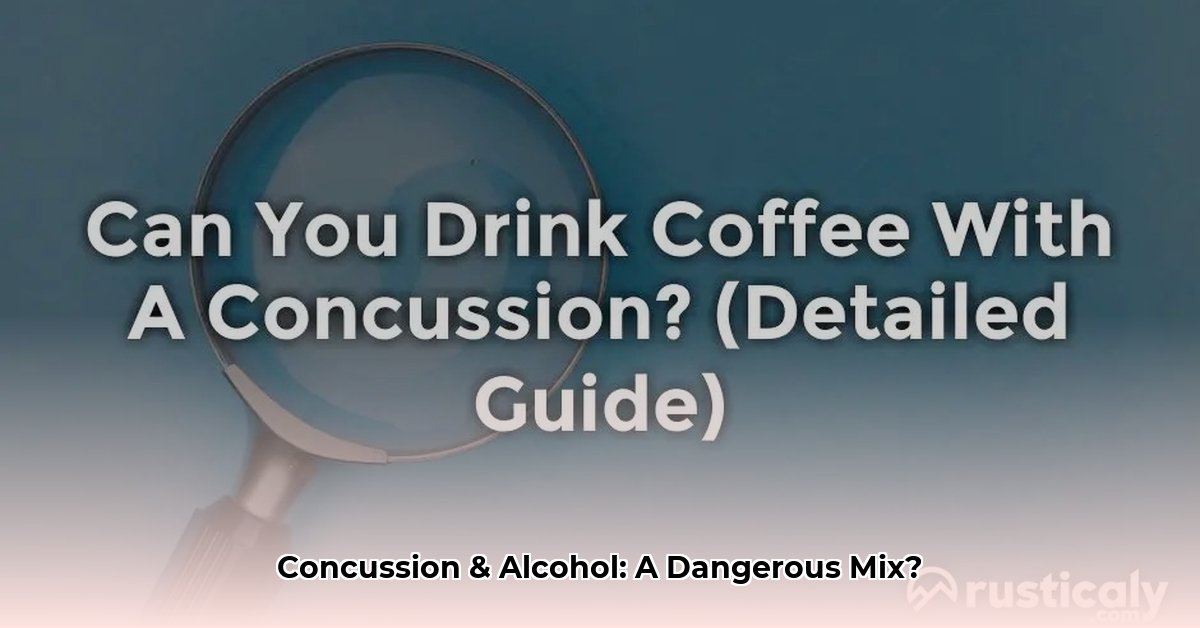No, you absolutely should not drink alcohol after a concussion. Doing so can seriously impede healing, mask crucial symptoms, increase your risk of re-injury, and potentially lead to long-term complications.
Why Alcohol and Concussions Are a Dangerous Mix
Alcohol interferes with your brain’s natural healing process after a concussion. It can also exacerbate symptoms, making it harder to assess the injury’s severity and delaying proper treatment. Furthermore, alcohol impairs judgment and coordination, increasing the likelihood of another accident and potentially a second concussion, which can be far more dangerous.
Understanding the Risks
Impaired Healing
A concussion disrupts the delicate chemical balance in your brain. Alcohol further disrupts this balance, hindering the brain’s ability to repair itself. It’s like trying to mend a broken bone while constantly jarring it. The healing process is significantly slowed down, prolonging your recovery.
Masked Symptoms
Alcohol can mask the symptoms of a concussion, making you feel temporarily better when you’re actually not. This can lead to underestimating the severity of the injury and delaying necessary medical attention. Masked symptoms can also lead to prematurely resuming activities, increasing the risk of further injury.
Increased Risk of Re-Injury
Alcohol impairs judgment and coordination. After a concussion, you are already more susceptible to falls and accidents. Alcohol exacerbates this risk, making you significantly more likely to sustain another head injury, which can have devastating consequences, especially while the brain is still vulnerable. A second impact can lead to more severe and long-term complications.
Potential Long-Term Effects
Some studies suggest a correlation between alcohol consumption after a concussion and an increased risk of long-term cognitive difficulties, including problems with memory, concentration, and processing speed. More research is needed to fully understand this link, but it underscores the importance of avoiding alcohol during recovery. Additionally, alcohol can increase the risk of developing post-concussion syndrome, a condition characterized by persistent symptoms like headaches, dizziness, and cognitive impairment.
Dangerous Drug Interactions
If you’re taking medication for your concussion symptoms, mixing them with alcohol can be dangerous. Always consult your doctor or pharmacist before consuming alcohol while on any medication, including over-the-counter drugs. The interaction of alcohol and certain medications can lead to adverse reactions, reduce the effectiveness of the medication, or even create toxic compounds in the body.
How Long Should You Abstain?
Abstain from alcohol until all your concussion symptoms have resolved and you receive clearance from your doctor. Recovery timelines vary, and there’s no set duration. Some individuals recover quickly, while others may take weeks or even months. Prematurely resuming alcohol consumption can hinder recovery and increase the risk of long-term issues.
Alcohol Dependency and Concussions
If you have alcohol dependency, a concussion presents unique challenges. Suddenly stopping alcohol intake can trigger withdrawal symptoms, which can be severe and even life-threatening. It’s crucial to seek immediate medical supervision. Doctors can manage withdrawal symptoms safely while also addressing your concussion. Resources like the Substance Abuse and Mental Health Services Administration (SAMHSA) National Helpline (https://www.samhsa.gov/find-help/national-helpline) can provide support and guidance.
What to Do If You’ve Already Drank
If you’ve consumed alcohol after a concussion, seek immediate medical attention. Even a small amount of alcohol can negatively impact recovery. Be honest with your doctor about how much you drank. This information is essential for accurate assessment and treatment.
Concussion Recovery Tips (Beyond Alcohol)
- Rest: Prioritize sleep and avoid mentally taxing activities.
- Physical Rest: Avoid strenuous physical exertion until cleared by your doctor.
- Hydration: Drink plenty of water to support overall health and brain function.
- Nutrition: Eat a balanced diet to provide your body with the nutrients needed for healing.
- Follow Medical Advice: Adhere to your doctor’s instructions carefully.
- Cognitive Rest: Limit screen time, reading, and other mentally demanding activities.
- Return to Activity Gradually: Slowly reintroduce physical and cognitive activities as directed by your doctor.
FAQs
- Does the type of alcohol matter? No, all types of alcohol can negatively impact concussion recovery.
- What if my concussion seems mild? Even mild concussions require abstaining from alcohol.
- Can I drink after my symptoms disappear? No, wait for your doctor’s clearance before resuming alcohol consumption.
Resources and Further Information
- Centers for Disease Control and Prevention (CDC): https://www.cdc.gov/traumaticbraininjury/index.html
- National Institutes of Health (NIH): https://www.ninds.nih.gov/current-research/focus-disorders/traumatic-brain-injury
A concussion is a serious injury. Proper recovery is essential for your long-term health. By avoiding alcohol and following medical advice, you give your brain the best chance to heal fully. While current research strongly suggests avoiding alcohol, ongoing studies continue to explore the complex relationship between alcohol and concussion recovery. Staying informed and consulting with healthcare professionals is crucial for making the best decisions for your health.
- Rectangular Glass Food Storage Containers For Meal Prep - January 27, 2026
- Borosilicate Glass Food Containers Keep Meals Fresh and Organized - January 26, 2026
- Choosing Glass Containers With Snap Lids for Fresh Food Storage - January 25, 2026










